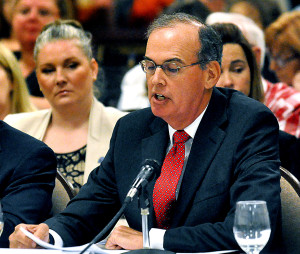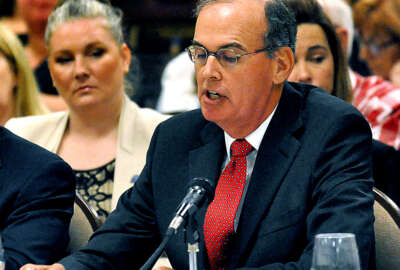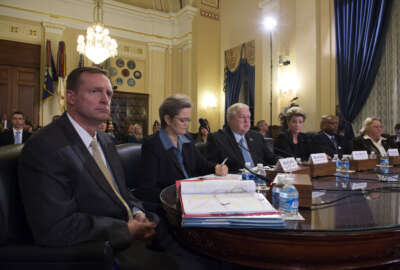
Transparency key to VA IG’s plans to restore trust
Veterans Affairs' Inspector General Michael Missal wants to turn his office around and regain the confidence of employees, whistleblowers and the public.
Restoring trust to the embattled Office of the Inspector General at the Veterans Affairs Department is a full-time job. The man who accepted that job in April, Michael Missal, has a plan to do just that, and it relies on an increase in transparency.
“Transparency can be defined a couple of different ways: One is internal transparency,” Missal told the Federal Drive with Tom Temin. “I want to make sure the staff understands decisions from leadership, our priorities, and make sure we’re all working toward the same goal.”

He began working toward that end immediately after his confirmation.
“Given the significance of the work of this office, I decided I was going to hit the ground sprinting, not running,” Missal said.
He made it a priority to meet every employee that worked for the OIG that he could, including those outside the Washington area. He also sent out a survey to find out exactly what employees thought about the work the office was doing.
“What do we do well? Where can we improve?” he asked. “What else do you think I should know as the new IG here?”
Employees’ responses told Missal that they were highly dedicated to their mission, but the main issue was that the office needed to be better aligned with how the VA spends money and serves veterans. The office needs to be paying more attention to high risk areas, where the most money and services are spent.
Missal said there are three main principles he’s conveyed to the staff that the OIG needs to be operating under to do their job better.
“First, we have to make sure that we’re independent, and that we even have the appearance that we’re independent, and there’s nothing going to challenge that,” Missal said. “Secondly, we’re as transparent as possible. The public and the veterans are entitled to know all of the work of this office, and the reasons why we reach certain conclusions. The third thing is the quality of our work. All of our work needs to meet at least five standards: needs to be accurate, needs to be timely, needs to be thorough, needs to be objective and it needs to be fair.”
Military benefits questions? Chat with DHA Deputy Director, Capt. Edward Simmer Aug. 10 at 11 a.m.
Having an inspector general who was nominated by the President and confirmed by the Senate will make a big difference within the office, Missal said, because employees understand that person has the confidence and weight of those stations behind him, which conveys more authority than an acting IG can.
The Senate confirmed Missal as frustrations with the office reached a peak. A series of high-profile IG investigations ended in failure, only to be capped off by the revelation from the Office of Special Counsel — one week after Missal was confirmed to the position — that the OIG mishandled three separate cases of whistleblower allegations as well. That’s why whistleblowers are another group Missal is trying to regain the trust of.
“Whistleblowers are critical to our work,” he said. “We do get a significant amount of leads from whistleblowers. We assess each and every allegation that comes in through either whistleblowers or anyone else. What we want to do is make sure that they recognize this is an agency where they can feel comfortable coming to us, that we’re going to look at things fairly and objectively and thoroughly, and if they want to be protected, their identity wants to be protected, they’re going to be protected.”
While he works on improving transparency within the OIG and the VA as a whole, he also wants to ensure accountability with the only people the OIG actually reports to: veterans and citizens.
“With respects to external transparency, we have essentially been given a fiduciary duty to look and do oversight of VA and it’s the public’s right to know what we’re doing and why we’re doing it,” Missal said. ”So we’re making sure that all the work that we do that can be disclosed publicly is.”
He said that health records and ongoing criminal investigations can’t be disclosed due to legal protections. But he wants to ensure the public knows anything that isn’t otherwise protected by law.
Copyright © 2025 Federal News Network. All rights reserved. This website is not intended for users located within the European Economic Area.
Daisy Thornton is Federal News Network’s digital managing editor. In addition to her editing responsibilities, she covers federal management, workforce and technology issues. She is also the commentary editor; email her your letters to the editor and pitches for contributed bylines.
Follow @dthorntonWFED





